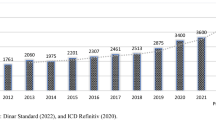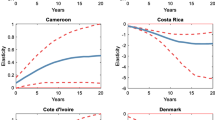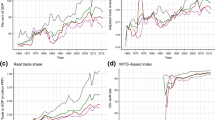Abstract
This paper endeavours to determine in how far theories emphasising cultural values, dysfunctional institutions or impediments to trade can explain the vast differences in the size of financial systems across the globe. To account for endogeneity, an instrumental variables approach is pursued. For a cross-section of countries, we find that trade openness and institutions constraining the political elite from expropriating financiers tend to promote financial development. Conversely, there is only limited evidence that cultural beliefs and the cost of enforcing financial contracts significantly hamper financial development.
Similar content being viewed by others
References
Acemoglu, D., and S. Johnson (2005). Unbundling Institutions. Journal of Political Economy 113 (5): 949–995.
Acemoglu, D., S. Johnson, and J. A. Robinson (2001). The Colonial Origins of Comparative Development: An Empirical Investigation. American Economic Review 91 (5): 1369–1401.
Ades, A., and R. Di Tella (1999). Rents, Competition, and Corruption. American Economic Review 89 (4): 982–993.
Alesina, A., A. Devleeschauwer, W. Easterly, S. Kurlat, and R. Wacziarg (2003). Fractionalization. Journal of Economic Growth 8 (2): 155–194.
Beck, T., A. Demirguc-Kunt, and R. Levine (2000). A New Database on Financial Development and Structure. World Bank Economic Review 14 (3): 597–605.
Beck, T., A. Demirguc-Kunt, and R. Levine (2003). Law, Endowments, and Finance. Journal of Financial Economics 70 (2): 137–181.
Djankov, S., R. La Porta, F. Lopez-de-Silanes, and A. Shleifer (2002). The Regulation of Entry. Quarterly Journal of Economics 67 (1): 1–37.
Do, Q. T., and A. A. Levchenko (2007). Comparative Advantage, Demand for External Finance, and Financial Development. Journal of Financial Economics 86 (3): 796–834.
Dollar, D., and A. Kraay (2003). Institutions, Trade, and Growth. Journal of Monetary Economics 50 (1): 133–162.
Easterly, W., and R. Levine (1997). Africa’s Growth Tragedy: Policies and Ethnic Divisions. Quarterly Journal of Economics 112 (4): 1203–1250.
Easterly, W., and R. Levine (2003). Tropics, Germs, and Crops: How Endowments Influence Economic Development. Journal of Monetary Economics 50 (1): 3–39.
Feeney, J., and A. L. Hillman (2004). Trade Liberalization through Asset Markets. Journal of International Economics 64 (1): 151–167.
Frankel, J. A., and D. Romer (1999). Does Trade Cause Growth? American Economic Review 89 (3): 379–399.
Frankel, J. A., and A. Rose (2002). An Estimate of the Effect of Common Currencies on Trade and Income. Quarterly Journal of Economics 117 (2): 437–466.
Gallup, J. L., J. D. Sachs, and A. D. Mellinger (1999). Geography and Economic Development. Center for International Development Working Paper 1. Harvard University, Cambridge, Mass.
Hall, R. E., and C. I. Jones (1999). Why Do Some Countries Produce So Much More Output per Worker Than Others? Quarterly Journal of Economics 114 (1): 83–116.
Huang, Y., and J. Temple (2005). Does External Trade Promote Financial Development? Bristol Economics Discussion Paper 05/575. University of Bristol, Bristol.
Landes, D. (1998). The Wealth and Poverty of Nations. New York: Norton.
La Porta, R., F. Lopez-De-Silanes, A. Shleifer, and R. W. Vishny (1997). Legal Determinants of External Finance. Journal of Finance 52 (3): 1131–1150.
La Porta, R., F. Lopez-De-Silanes, A. Shleifer, and R. W. Vishny (1999). The Quality of Government. Journal of Law, Economics, and Organization 15 (1) : 222–279.
Levine, R. (1997). Financial Development and Economic Growth: Views and Agenda. Journal of Economic Literature 35 (2): 688–721.
Levine, R. (2005). Finance and Growth: Theory and Evidence. In P. Agihion and S. Durlauf (eds.), Handbook of Economic Growth. Amsterdam: Elsevier.
Lucas, R. E. (1988). On the Mechanics of Economic Development. Journal of Monetary Economics 22 (1): 3–42.
North, D. (1981). Structure and Change in Economic History. New York: Norton.
North, D. (1990). Institutions, Institutional Change, and Economic Performance. Cambridge: Cambridge University Press.
Rajan, R. G., and L. Zingales (2003). The Great Reversals: The Politics of Financial Development in the Twentieth Century. Journal of Financial Economics 69 (1): 5–50.
Rodrik, D., A. Subramanian, and F. Trebbi (2004). Institutions Rule: The Primacy of Institutions over Geography and Integration in Economic Development. Journal of Economic Growth 9 (2): 131–165.
Sachs, J. (2003). Institutions Don’t Rule: Direct Effects of Geography on Per Capita Income. NBER Working Paper 9490. National Bureau of Economic Research, Cambridge, Mass.
Staiger, D., and J. H. Stock (1997). Instrumental Variables Regression with Weak Instruments. Econometrica 65 (3): 557–586
Stulz, R. M., and R. Williamson (2003). Culture, Openness, and Finance. Journal of Financial Economics 70 (2): 313–349.
Svaleryd, H., and J. Vlachos (2002). Markets for Risk and Openness to Trade: How Are They Related? Journal of International Economics 57 (2): 369–395.
Author information
Authors and Affiliations
Corresponding author
Additional information
JEL no.
F36, G2, O16
About this article
Cite this article
Herger, N., Hodler, R. & Lobsiger, M. What Determines Financial Development? Culture, Institutions or Trade. Rev World Econ 144, 558–587 (2008). https://doi.org/10.1007/s10290-008-0160-1
Issue Date:
DOI: https://doi.org/10.1007/s10290-008-0160-1




